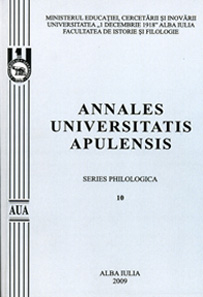OEUVRE OUVERTE ET SAVOIR ENCYCLOPÉDIQUE
OPEN WORK AND ENCYCLOPAEDIC KNOWLEDGE
Author(s): Rodica Gabriela ChiraSubject(s): Literary Texts
Published by: Universitatea »1 Decembrie 1918« Alba Iulia
Keywords: plural reading; model reader; updating semantics; textual cooperation; incipit; opera aperta
Summary/Abstract: A literary work is a unitary system in which various interpretations communicate with each other. Umberto Eco sees it as "a syntactic-semantic and pragmatic artifice whose interpretation is scheduled to represent its own generative project" ("Lector in fabula"). Having as a starting point the novel "The Other World" of Cyrano de Bergerac, a novel which allows a plural reading, the interpretation we propose is based on a semantic reshaping of what the text, as a strategy, means through its cooperation with its "Model Reader". We will then approach the theme of the voyage through the book from the perspective of a reader who can re-build a work. It is rather a journey of a discourse that treats the problem of reading, a philosophical and scientific reading, the only possible in the 17th century when the role of science was not yet sufficiently acknowledged, a reading that cannot ignore the symbolic side, nor that of non-serious. More than any other book, "The Other World" would not have existed without the prior readings of its author. As procedure for our analysis, we chose the incipit. In order to meet the needs of our approach, our incipit will be represented by a whole narrative sequence. The interpretation starts mainly from the model of text cooperation proposed by Umberto Eco in "Lector in fabula" which we tried to adapt to our needs. This model offers the following levels: the manifestation of linear text, predictions and inferential walks; structure of worlds; the discursive structures; narrative structures; actantial structure; ideological structure. This approach leads to the idea of the book in the book, the work in the work. The text repeats what it is dealing with in spite of continuous changes in the way of saying. This generalizing mise en abyme exposes the context to a semantic expansion of which it would not be capable by itself: the microcosm that is man is reflected in the macrocosm, the earth is reflected in the Moon, the book which includes is included in its turn leading to the total oeuvre. We are tempted to believe that in a somewhat different perspective, the quality of opera aperta can also be attributed to "The River of the Eternity" by Ph. J. Farmer, "immense saga" essentially written between 1966 and 1971. It is a text that, in general, operates on the same principle as "The Other World". It evokes several books whose content is "adapted" to the current events, technical changes herein. It asks the reader a vast encyclopedic knowledge. The resurrection in the same place - in a possible world, on the banks of a river "running on 20 000 or perhaps 40 000 kilometers" and at the same time - beyond the 21st century - of people and personalities from all known civilizations in our world, offers the writer the opportunity to confront these civilizations and discuss more or less old books. These books are, for the most part, fictional.
Journal: Annales Universitatis Apulensis. Series Philologica
- Issue Year: 11/2010
- Issue No: 3
- Page Range: 172-191
- Page Count: 20
- Language: French

